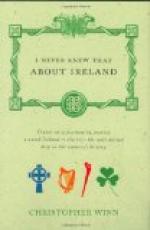Take too the Irish Home Rule press, and read the floods of abuse—some spreading out into absolute obscenity—published by the principal papers day after day against all their political opponents, and we can judge of the temper with which the Irish Home Rulers would administer affairs. Of their statesmanlike provision—of their patriotism and care for the well-being of the country at large—the local war now ruining Tipperary is the negative proof—the damnatory evidence that they are utterly unfit for practical power. Governed by hysterical passion, by mad hatred and the desire for revenge, not one of the modern leaders, save Mr. Parnell, shows the faintest trace of politic self-control or the just estimate of proportions. To spite their opponents they will ruin themselves and their friends, as they have done scores of times, and are doing now in Tipperary. History holds up its hands in horror at the French Terror—was that worse than the system of murder and boycotting and outrage and terrorism in the disturbed districts in Ireland? And would it be a right thing for England to give the supreme power to these masked Couthons and Robespierres and Marats, that they might extend their operations into the now peaceable north, and reproduce in Ulster the tragedies of the south and west? Mr. Parnell puts aside the tyrannous part of the business, and cleverly throws the whole weight of his argument at Nottingham into the passionless economic scales. All that the Nationalist party desires, he says, “is to be allowed to develope the resources of their own country at their own expense,” “without any harm to you (English), without any diminution of your resources, without any risk to your credit, or call upon you,” all to be done “at our own expense and out of our own resources.” Yet Mr. Parnell in another breath describes Ireland as “a Lazarus by the wayside”—a country “where unfortunately there is no manufacturing industry.” “Ex nihilo nihil fit,” was a lesson we all learned in our school days. Mr. Parnell has evidently forgotten his.
I will give a commentary on these brave words which is better put than I could put it.
TO THE EDITOR OF THE “STANDARD.”
“Sir,—People in England, whatever political party they belong to, should glance at what is now going on in the town of Tipperary before finally making up their minds to hand over Ireland body and soul to the National League. No country town in Ireland—I think I may add or in England either—was more prosperous three months ago than Tipperary. The centre of a rich and prosperous part of the country, surrounded by splendid land, it had an enormous trade in butter and all agricultural produce, and a large monthly pig and cattle fair was held there. It possessed (I use the past tense advisedly) a number of excellent shops, doing a splendid business, and to the eyes of those who could look back a few years it was making rapid progress in prosperity every year.




